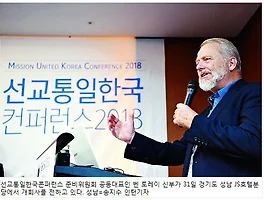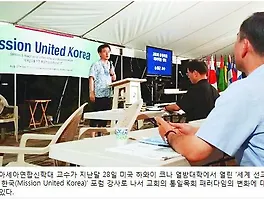In leery South Korea, American missionary couple works for reunification of North and South
May 9, 2018
Aziza Kasumov
Ben Torrey holds his hand over a map of the Korean peninsula while explaining a shrine at the convergence of Korea's three main watersheds.
The American missionary aims to prepare South Korean youth for the peninsula’s eventual reunification. RNS photo by Alan Mittelstaedt.
TAEBAEK, South Korea (RNS) — This could have been the quietest place in all of South Korea. But as American missionary Elizabeth Torrey leads a group of high school students up a rocky mountain road, their chatter and footsteps in the melting snow sharply pierce the silence. The town of Taebaek, three hours southeast of Seoul, slowly disappears in the distance, taking any trace of civilization with it.
They come up here to a mountain plateau to pray for Korean reunification. In making such prayers, they’re as far removed from the mindsets of most young South Koreans as this remote location suggests. But the Torrey family of missionaries is convinced God is leading them to educate the “unification generation.”
“This land, this undivided land, is your inheritance,” Elizabeth Torrey tells her students during the prayer session. “And your prayers of your heart matter to see that happen.”
It’s apt to be an uphill climb. Most young adults in this country reject the idea of reuniting with North Korea, which has been a separate country since long before they were born. Seventy-one percent of South Koreans in their 20s oppose reunification, according to a survey released last year by the Korea Institute for National Unification, a government-sponsored think tank. That’s higher than across the nation as a whole: 58 percent still want reunification, though that number is down from 69 percent four years ago.
Young South Koreans might want peace and denuclearization, but not reunification, which they fear would bring costly economic repercussions for their country.
Kyung Min, center, discusses Korean reunification with his school peers at the River of Life School near Taebaek,
South Korea. RNS photo by Alan Mittelstaedt
“For the old generation, the divided Korea is abnormal, and the unified Korea is the normal state,” says Sang Sin Lee, a researcher at the Korea Institute for National Unification. “But for the younger generation, it’s the normal state. So for them, reunification is maybe unnecessary. To them, it’s a risk.”
But the minority who crave reconciliation have found in Elizabeth Torrey and her husband, Ben, partners who believe God’s plan calls for a reunited Korea.
Having grown up in South Korea in a missionary family, Ben Torrey says, he moved his family back to Korea from Connecticut in 2005 after he heard God speak to him during prayer. The message, as he recalls it: North Korea would be opening to the world soon, but the South Korean church wasn’t ready.
Ben Torrey sits in his Jesus Abbey office near Taebaek, South Korea,
where he orchestrates his strategy of preparing South Korean youth for Korean reunification.
RNS photo by Alan Mittelstaedt
Ben Torrey now feels called to do his part in what he believes is God’s grand plan. Reunification could facilitate “a new era of missions,” he says, “carrying the gospel along with renewed Chinese and Japanese churches through Muslim lands back to Jerusalem.”
International hopes for a less tense, more stable and possibly reunified Korean Peninsula rose recently when North Korean leader Kim Jong Un shattered expectations by visiting South Korea for historic denuclearization talks in April. Though South Koreans remain skeptical, the Torreys hope an act of God will open their hearts to reunification prospects.
A grandson of American evangelist Reuben Archer Torrey, Ben Torrey has deep ties to ministry efforts on the Korean Peninsula. In 1965, his father, Reuben Archer Torrey III, founded Jesus Abbey, a nondenominational Christian community where about 30 people live in the isolated Taebeck Mountains and host retreats. Ben Torrey is a bishop in the Syro-Chaldean Church of North America, which describes itself as Evangelical Apostolic, and he works closely with South Korea’s charismatic communities.
Today, Ben and Elizabeth Torrey run a school, River of Life, for children in the Christian community and surrounding area. Parents appreciate how children are given an alternative to South Korea’s hypercompetitive education system, according to Ben Torrey.
“We focus on teaching kids not to memorize, but to think,” he says.
Those with a Christian faith also learn to pray. With their students, the Torreys use a makeshift shrine to pray to Ju-yo, the Lord, for reconciliation and reunification. Learning to think in new ways will be necessary, some say, if young people are going to embrace reunification. That’s because old ways of convincing people don’t work anymore.
“The South and North Korean governments used to persuade the population that we have to reunify because we are one nation,” Lee says. But nationalism as a motivator for reunification doesn’t seem to work with younger South Koreans. “We need a new way to persuade people, to make them understand why a divided Korea is abnormal.”
Ben Torrey tries to follow those instructions to reverse this trend, one student at a time. To him, it’s about moving the issue from a textbook chapter to a personal experience. As often as he can, he arranges visits between his students and North Korean defectors living and studying in the South. It seems to work, at least sometimes.
The River of Life School students assemble around a shrine that marks the meeting point of Korea’s three main watersheds.
RNS photo by Alan Mittelstaedt
“I went to a public elementary and middle school. In that school, at least once a year, we talked about reunification, but it was just something in the textbook, nothing that comes alive,” says Jin-soo (his first name), one of the students at River of Life School. He spoke through a translator. “But when I had a chance to meet other North Korean students personally, I began thinking from their perspective. They are the same as I am.”
Jin-soo, who lives with his parents at Jesus Abbey, says it took him about a year to reverse his attitudes on reunification. Not all of his peers agree that reunification would be wise.
“When I meet someone who expresses a negative view about reunification, this negative opinion is so much stronger,” says Min-ha (his first name), a school student who used to live with his parents at Jesus Abbey before the family moved to a house in Taebaek. “I don’t really have any strong arguments to counter that. I find myself speechless.”
In many ways, Ben Torrey is going against the odds – an increasingly detached South Korean public and a tension-heavy relationship between the two countries he hopes to see reunified. On top of that, he says the deeply divided South Korean church, large parts of which still take a firmly anti-communist and anti-North Korean stance, needs to unify before North Korea can be opened at all.
How does he plan to overcome all those divisions?
“I don’t,” he says with a laugh. “God has to do it. It has to be a miracle.”
'대외 활동' 카테고리의 다른 글
| [책]대형교회의 선교책무(2016.6. 30) (0) | 2018.09.14 |
|---|---|
| [국민일보]북한사역목회자협의회 등 6개 단체, 선교통일한국협의체 띄웠다 (0) | 2018.09.14 |
| [국민일보]“북녘 어린이 재활병원 건립” 한국교회의 사랑 뜨거웠다 (0) | 2018.09.14 |
| [국민일보][제1회 코나 통일 포럼] 국내외 통일사역자들, 북한선교 위해 머리 맞댔다 (0) | 2018.09.14 |
| [조선일보][Why] '통일 땔감' 모으는 신부님 (0) | 2018.09.14 |







